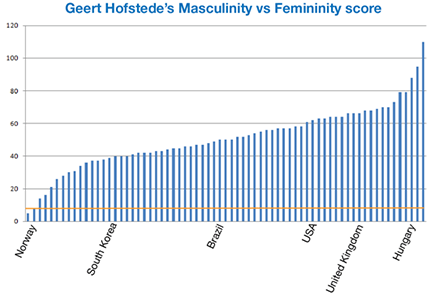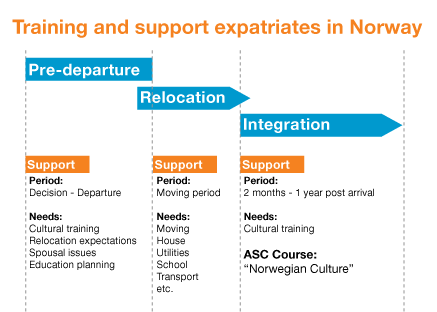ASC articles
An expatriation challenges our sense of identity 30. October 2012 An expatriation entails a move from a familiar to a foreign environment, which in turn changes the foundation for a person's identity. This shift can be stressful while the necessary adjustment is made. To understand why this occurs we must first look at common sources of identity. Although there are many potential sources, we will here focus on social and personal identification. Our social identification comes from how others see us and what part we play in our community - the roles we have and sources of external validation. Personal identification is how we see ourselves, what values we embody, intrinsic interests and hopes for the future.
When relocating abroad many of our social identity bonds are either broken or weakened. Friends and family are far away and no longer part of day to day activities, familiar activities, like sports and media, may no longer be available. A spouse, whose job and corresponding validation have been put on hold, feels a further loss. Personal identification may also face changes, as previously valued abilities may no longer be useful, long term interests, sports and hobbies can be hard to continue and the new environment may question previously held values. The result is often a feeling of stress, as it is mentally challenging to experience the need for an identity realignment not to speak of the process of replacing lost sources with new and suitable ones.
The solution lies in building a social network, of sufficient size, breadth and depth to be robust and cater to various identity needs. Size will decide how many potential sources of support are available. The breadths indicates the availability of how many different arenas, such as comfort, mentoring, inspiration and recreation. The depth is a measure of the quality and commitment of support one can expect. A good level of breath and depth will include friendship with other expatriates, with whom one can share the multiple experiences of being a foreigner; and include local friends who can offer cultural insight; all of which in turn reduces the feeling of being foreign and out of touch with the new society and working environment.
Ironically stress during the first period abroad may sabotage the realignment process, as the need to alleviate stress may cause the expatriate to accept any new source on offer, rather than ensure the optimal range and type of support. Commonly seen example are expatriates who, during their first weeks abroad, join clubs and groups of other expatriates from their own country; and stick with them throughout their stay. In the worst case, these new groups are far from those most in line with the newcomer's real interests.
Optimally, prior to departure the expatriates identify what sources they want to cultivate while abroad, and set strategies for how to go about it. The right solution will differ from person to person, depending on his or her preferences, values and life situation. Further, not all destinations will offer perfect equivalents to what was available before departure; though more often than not, acceptable substitutes can be found. The most common example of this would be work for the spouses, as many countries preclude them from working. However, there are often other activities, such as volunteer work, which offer the same benefits.
Having lived through this process often results in a stronger sense of identity which expatriates cite as one of the great benefit of their time abroad.
At the ASC courses, spouses in particular are given tools to analyze their own situation and encouraged to map out a plan for how to identify and built necessary connections to find new sources of interest.

Sources include:
Shaffer, M., and D. Harrison. 2001. Forgotten partners of international assignments:
Development and test of a model of spouse adjustment. Journal of Applied Psychology 86,
no. 2: 238–54.
The Norwegian management style can be highly effective when adapted to local conditions 30. August 2012What one expects from a manager and how one acts as a manager is largely determined by cultural setting. Explicit understanding of one's own view of management makes it easier to see the differences when working internationally, which in turn makes it possible to adapt to local conditions for greater impact.
The results of the European Employee Index 2012 (EEI 2012) confirms that Norwegian leaders still score high on Geert Hofstede's dimension: feminine business culture, which describes a culture that is focused on:
- Relationships based on trust
- Consensus between manager and employee
- Cooperation
- High degree of job security
These results are in line with government initiatives in Norway, such as "Inclusive Workplace", a program to reduce sick leave through requiring the employer to adapt the workplace and tasks to an individual's health situation. (See Link) In contrast, tools to rank employee performance, relative to other employees in the firm, are common in the U.S.A., a country with a masculine corporate culture. Notable examples of this practice in the U.S.A. include Microsoft, General Electric and Accenture.
The EEI 2012 report provides a list of 16 abilities a manager needs. The results show that Norwegian managers have high scores on three factors: Involvement, support, confidence and recognition; factors that harmonize with the feminine business culture. Similarly, Norwegians score low on: Feedback, inspiration, monitoring, performance culture and objectives which are factors more focused on in masculine business cultures.
Norway and Sweden score highest on the feminine dimensions in the world. Although there is variation on how individuals score, based on experience, personality and business, Norwegians will tend to experience a more masculine corporate culture when working internationally. This is both the case for those who manage and those who work as specialists abroad. Work becomes more effective when one is aware of likely differences in expectations to managers. Whether one should adapt to local expectations, make differences explicit to all parties, or find another solution, depends on the situation at hand. For any solution, knowledge and understanding of the differences is a necessary condition.
Most people who have worked abroad have their own examples of how this adaptation was critical, many experienced a consequence of reduced productivity. One such example is from a Norwegian manager in London who wanted to build commitment to the project by seeking consensus for a major decision. The local employees saw this as a sign of uncertainty and weakness. Local expectation to a good manager was that he sought advice before making a clear decision and informing the group.
For those who work abroad for a significant period, it is common to experience a new adjustment when returning to the Norwegian labor market. The end result is that managers and employees have broader experience of different management abilities, providing a good basis to draw on when they need to adapt their leadership style to a given situation.
The Norwegian management style, well adapted to local conditions, has proven to be highly effective for many working abroad. To manage this process it is useful to have knowledge and understanding of the cultural dimension tools such as Hofstede's dimensions, which makes it possible to grasp the specific differences and find win-win solutions for all parties. The ASC culture courses build on these tools and focus on providing participants with practical and applicable tools.

Links:
http://www.idebanken.org/Om+IA
http://geert-hofstede.com
http://no.ennova.com/kunnskap/european-employee-indexreg-rapporter.aspx
Traveling with children 8. August 2012
When a family decides to take an expatriation they also accept that there will be a lot of travelling. While many children enjoy the excitement of travel, it can be stressful for parents. Rather than relying on entertainment and activities supplied by some airlines, parents should prepare for the journey, such as:
- Bring a varied activities pack to keep your child occupied. The pack can include travel games, books, films, information about the destination, audio books and music. Include some toys, for example the magnetic or velcro games for children over 3 years, which are only to be used when traveling, so as to keep them novel.
- Young children sleep better in familiar sleeping clothes and own pillow rather than their daytime travel clothes and airline hand-outs. Parents should therefore be prepared to help children change into sleepware on a flight.
- Ensure the whole family eat and drink healthily throughout the journey, avoiding sugar and drinking more than usual; so as to keep a steady level of blood sugar. Order food for children well in advance if there are any substances the children cannot eat.
For more advice on traveling with children, we recommend Catherine Cooper's "Travelling with Children: A Parent's Guide". This book offers suggestions for just about any situation, practical advice for planning, ideas for making the trip seem more fun for the little ones and sensible encouragement to meet the challenges of great destinations such as Wild Life Parks. The book addresses the practicalities of travelling with children of all ages, from newborn to teenage, and it also discusses how to deal with a group of mixed-aged children and the issues that might arise.
Families with children under one year old will also find "The Rough Guide to Travel with Babies" by Fawzia Rasheed de Francisco an inspiring read. For those with an e-book reader like the Kindle, Shelly Rivoli's "Take-Along Travels with Baby: Hundreds of Tips to Help During Travel with Your Baby, Toddler and Preschooler" is invaluable. It's full of bullet points, checklists and how-to photos that help keep young children safe, happy, entertained, fed and sleeping as well as possible when away from home.
Parents, and especially those travelling to off-the-beaten-track countries in Africa and Asia, should also consider the Bradt Travel Guide Your Child Abroad: a Travel Health Guide. It is worth reading before you travel as it has useful tips on what to take and what to avoid. It is clearly laid out and well written so that any concerned parent would find it useful. It has excellent checklists that you can use to determine if the symptoms your child has are serious in any way and provides excellent advice.
The topics of how best to prepare for traveling with children is covered in detail at the ASC course: "Preparation for expatriation", so as to ensure the arrival at the destination is as pleasant as possible.
Religion matters more than we believe. 31. May 2012 Throughout time religion has played a key role in shaping most national cultures. Although different religions influence differently, so a specific faith will vary depending on other, often political and historical, factors. In spite of 86% of Norwegians being registered as Christians, only 20% say religion plays an important part of their life; and only about 2% attend church weekly; among the lowest scores in the world, and stand in stark contrast to those found in the USA, where 80% are Christian, 56% say it is important in their lives and, on average, 39% attend church weekly.
Comparable statistics for Muslim countries are even more starkly different from those in Norway.
Islam explicitly praises people who are familiar with the Holy text, knowledge which in turn elevates a person's status. Ministers in the Norwegian Seaman's Church have long benefited from this in the Middle East. Though not explicit, the same holds true in countries like the USA, where holding a position in the local church will give status and standing in the community. Realizing and acknowledging this can pave the way for mutual respect.
Knowledge of the Holy text will also help understand language, as one will hear many quotes and references from the Bible in everyday dialogue. An example is that instantly knowing the background for mention of a "Samaritan", a "Mensch" or "Eid" when it comes up in text or conversation can be useful in getting the whole point being made.
Further, by simply being aware of the differences in faiths, expatriates can show sensitivity. One expatriate suggested rescheduling a training session to Sunday at noon. Very few of her local friends had time, due to church attendance. Another expatriate was discussing relationships , when her American friend explained that she might consider living with her boyfriend, but not having children out of wedlock: "I could not do that to my parents!"
Even a rudimentary knowledge of the background for local holidays and festivals can spark interest and invitation from local acquaintances. This in turn can pave the way for valuable friendships.
At the ASC courses we give insight into the role of religion and how to approach the topic. Younger participants attending the children's course are further given an introduction to some of the major religious festivals in the part of the world which will be their new home.

Why companies need to offer Norwegian cultural training15. March 2012 An expatriation process has three stages: preparation, relocation and integration; each of which has specific support requirements. While most companies give support at the relocation stage, many neglect the integration stage, especially for expatriates arriving to work in Norway.
Preparation
The preparation stage starts when the decision to relocate is made and until about 1-2 weeks before departure. At this stage the expatriate needs information and understanding of what challenges will arise, and given strategies for how to solve them when they do. Topics range from exploring cultural issues from various viewpoints, recognizing the stressors of moving, social issues, schooling concerns and possibilities and challenges for the spouse. Robust preparation sets the stage for a successful relocation.
Relocation
The days before departure and the weeks following arrival are characterized by more practical matters that must be solved, including shipping personal belongings, setting up the new home, arranging banking services, transport, utilities, health care, school, recreation, familiarizing with the local area, understanding the layout at work, getting to know colleagues, work expectations, social arena, to mention a few aspects. Being specific and immediate, most companies help solve these challenges.
Integration
When most practical matters are solved, often after 1-2 months, cultural understanding and integration becomes increasingly important. The expatriate seeks to understand why things are the way they are, rather than simply accepting the facts. Colleagues are a great source to help understand the workplace, especially on specific work-related issues. However, the reason few expatriates will discuss cultural differences in depth with local colleagues is two-fold: first, many associate cultural knowledge with intelligence and will not wish to seem less competent in the eyes of locals. The second reason is the quite possible fear of offending. A question asked by a German living in Norway illustrates this point: "I get along especially well with one of my colleagues. In the autumn he told me about a big BBQ he was arranging... however, he did not invite me. Do you think I have misjudged our relationship?" Such a question would be awkward to ask at work. There are other issues which are registered, though not asked; like WHY an office is empty at 1545 on a warm, weekday, summer afternoon.
To understand Norwegian culture, most expatriates seek other expatriates, preferably from the same background, as a source for understanding. As a result, many expatiates fail to fully integrate and understand Norwegian culture, as few have the training and ability to explain culture in a way that can be understood by foreigners; and those who are foreign themselves have their own, too often very erroneous, take on Norway.
A good solution is to offer the expatriate sessions of cultural training where they can discuss their own observations in a safe environment, with answers embedded in a robust cultural framework. Questions from foreigners in Norway range from social behavior, food culture, politics, religion to equality. Recently a participant at an ASC course said: "Yes, I understand it is politically correct to say everyone is equal here, but in reality, what is the actual situation?" With this question, the participant demonstrated knowledge, but limited understanding which is necessary for successful integration in this country.
The need for cultural training is not as obvious and immediate as, for example, housing but can reap large rewards in terms of integration and efficiency. Employers need to proactively offer such training to foreign nationals working in Norway.
ASC offers Norwegian culture training sessions for expatriates who have lived in Norway for 2 - 12 months.

Repatriation: Where is the red carpet?10. February 2012 Expatriates still abroad expect the return home to go smoothly. A year after the return, many describe this as the toughest part of the posting. The return process is characterized by three phases.
- Stardust phase
- Reality check
- Adaptation
The stardust phase is characterized by high activity and interest from friends, family and acquaintances. The home is set into shape and the shipped container must be unpacked, children start back at school and resume contact with old, and make new, friends. Colleagues at work show interest in the experiences from abroad during lunch. Life is not necessarily all good, frustrating meetings with Norwegian bureaucracy and regulations regarding school processes can take their toll. However these hurdles are often met with the same problem solving attitude as served so well abroad.
The reality check occurs gradually, as life falls into place with fewer tasks to solve, and daily life is characterized by a certain sensation of living in a vacuum. The employee, who is accustomed to being special or unique abroad, is now only one of many equals, though lacking the local knowledge that has developed in Norway during his or her absence. A relevant and attractive position is not always open at the point of return, and the employee must take on a temporary job or project. As one returnee described it: "I have a wage, just not a job". The spouse starts to update his or her CV and tries to figure out the process of finding a job, a process that has changed since job hunting last time. Children in school discover that life, both academically and socially, has continued down a different path from their own. The whole family realizes that the benefits and habits they had become accustomed to abroad, are no longer available.
At the adaptation stage the employee finds an interesting and relevant position in the company, with opportunities to use the skills developed abroad. The spouse finds a job that is rewarding and reintegrates in a social environment. Children adjust to the school environment and learn to focus on the subjects they are relatively weak in. The family finds new activities and habits to replace those that were enjoyed abroad.
The time it takes for a repatriated employee, with or without family, to reach the adaption stage varies, for some it can take up to two years. This is a major stress for the employee, which can lead to discontent with the employer. Conversely, the company will not get the full potential value of the returned employee until the adaption phase is under way. For families with children, and especially teenagers, it can be imperative for the children's education and future that this process goes fast and the the correct decisions are made at school. Wrong choices and approaches can at best result in teenagers taking an extra year to retake exams. At worst, career paths can be closed. ASC offers courses for returned workers and families to raise awareness about the return process and provide assistance in how to meet the various challenges in the best possible way.
Please log in to read our older articles
How we say is as important as what we say, and varies between cultures. 12. November 2011
Expatriation increases creativity15. September 2011
Ethics: tools for your moral compass when living abroad9. August 2011
Etiquette: enhance and direct your communication when abroad9. May 2011
The expatriate spouse - a productive and positive experience31. March 2011
Preparing expatriate children for acceptance to international schools27. October 2010
Expatriates experience high levels of stress in the relocation process3. October 2010
Recommended reading for traveling with kids23. September 2010
|

